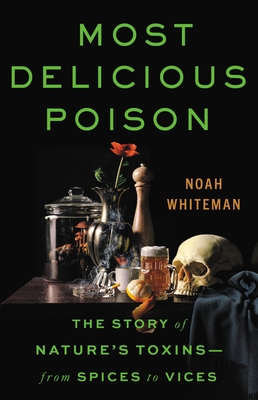English language
Published Oct. 24, 2023 by Oneworld Publications.

English language
Published Oct. 24, 2023 by Oneworld Publications.
A deadly secret lurks within our spice racks, medicine cabinets, backyard gardens, and private stashes.
Scratch beneath the surface of a coffee bean, a red pepper flake, a poppy seed, a mold spore, a foxglove leaf, a magic-mushroom cap, a marijuana bud, or an apple seed, and we find a bevy of strange chemicals. We use these to greet our days (caffeine), titillate our tongues (capsaicin), recover from surgery (opioids), cure infections (penicillin), mend our hearts (digoxin), bend our minds (psilocybin), calm our nerves (CBD), and even kill our enemies (cyanide). But why do plants and fungi produce such chemicals? And how did we come to use and abuse some of them?
Based on cutting-edge science in the fields of evolution, chemistry, and neuroscience, Most Delicious Poison reveals:
A deadly secret lurks within our spice racks, medicine cabinets, backyard gardens, and private stashes.
Scratch beneath the surface of a coffee bean, a red pepper flake, a poppy seed, a mold spore, a foxglove leaf, a magic-mushroom cap, a marijuana bud, or an apple seed, and we find a bevy of strange chemicals. We use these to greet our days (caffeine), titillate our tongues (capsaicin), recover from surgery (opioids), cure infections (penicillin), mend our hearts (digoxin), bend our minds (psilocybin), calm our nerves (CBD), and even kill our enemies (cyanide). But why do plants and fungi produce such chemicals? And how did we come to use and abuse some of them?
Based on cutting-edge science in the fields of evolution, chemistry, and neuroscience, Most Delicious Poison reveals:
This perpetual chemical war not only drove the diversification of life on Earth, but also is intimately tied to our own successes and failures. You will never look at a houseplant, mushroom, fruit, vegetable, or even the past five hundred years of human history the same way again.